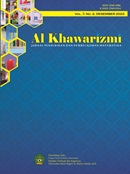The Students’ Mathematic Problem Solving Profile Reviewed on Gender Differences
DOI:
https://doi.org/10.22373/jppm.v7i2.20821Keywords:
Mathematic, Problem Solving, Gender.Abstract
The purpose of this research is to clarify how gender differences affect students’ ability to solve mathematical problems. This research uses a descriptive methodology and is classified as qualitative research. Students in SMA Batik 2 Surakarta’s eleventh grade for the 2020/2021 academic year are the research’s subjects. Retrieval of the challenge is finished by way of snowball sampling technique. The strategies of gathering statistics are executed by using the written check of college students’ problem fixing and interview. The research employed problem understanding, answer planning, troubleshooting as deliberate, and re-examining the solution’s outcome as indicators of problem solving. The consequences of the research display that female students can do all trouble solving tiers of mathematics at the same time as male students only perform a little trouble solving stages of mathematics.
References
Alifiani, S. M., Suyitno, H. and Supriyadi. (2018). Mathematical Problem Solving Abilities Viewed by Intelligence Quotient and Gender Grade. 7 (1) pp 81 – 87
Aliyah, I. M., Yuhana, Y., and Santosa, C. (2019). Sudents’ Mathematic Connection Ability in terms of Initial Ability and Gender. 6 (2) pp 161 – 178
Amir Z. (2013). Gender Persective. in Mathematic Learning. 12 (1) pp 14 – 31
Ariawan, R. and Nufus, H. (2017). The Relationship between Mathematic Problem Solving Ability and Students Mathematic Communication Skills. 1 (2) pp 82 – 91
Christidamayani, A. P. and Kristanto, Y. D. (2020). Ind. J. Learning and Advance Education. 2 (2) pp 100 – 108
Davita, P. W. C. and Pujiastuti, H. (2020). Analysis of Mathematics Problem Solving Ability Reviewed of Gender. 11 (1) pp 110 – 117
Hariastuti, R. T., Prawitasari, J. E, Handarini, D. M. and Atmoko, A. (2017). The Development of Critical Thinking Skills Based pf Patraptriloka’s Ki Hajar Dewantoro. 7 (7) pp 13606 – 13611
National Council of Teacher of Mathematics. (2000). Principle and Standars for School Mathematics. Reston VA: NCTM
Nugraha, T. H. and Pujiastuti, H. (2019). Analysis Os Students’ Mathematic Communication Ability Based on Gender Differences. 9 (1) pp 1 – 7
Nur, A. S. and Palobo, M. (2018). Profile of Mathematics Problem Solving Ability Study In Terms of Differences in Cognitive Style Gender. 9 (2) pp 139 – 148
Polya G. (1957) How to Solve it a New Aspect of Math. Method. United States of America: Princeton University Press
Purwaningsih, D. and Ardani A. (2020). Mathematic Problem Solving Ability Material Exponensial And Logaritna Viewed from Learning Styles and Gender Differences. 9 (1) pp 118 – 125
Zulfah. (2017). Profile of Study Mathematic Problem Solving Ability Study in Terms of Diff in Cognitive Style and Gender. 9 (2) pp 139 – 148

